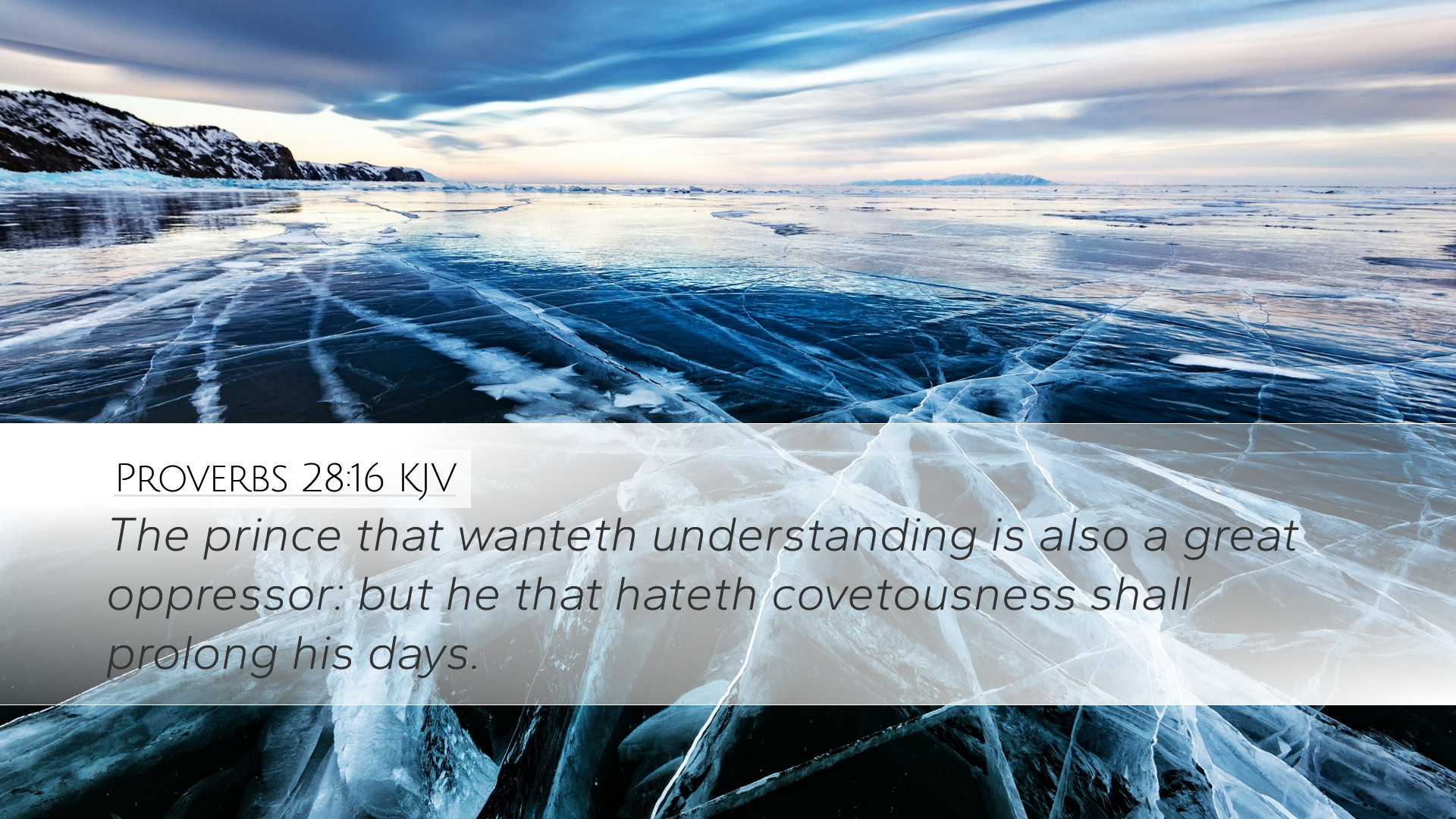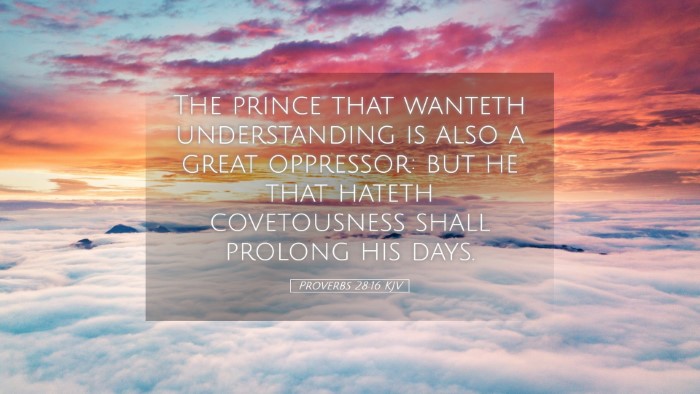Commentary on Proverbs 28:16
Verse: "The ruler that wanteth understanding is also a great oppressor: but he that hateth covetousness shall prolong his days."
Contextual Understanding
Proverbs 28:16 presents a contrast between two types of rulers: those who lack understanding and become oppressors and those who are wise and shun covetousness. This chapter of Proverbs emphasizes the importance of wisdom and moral integrity in leadership.
Insights from Matthew Henry
Matthew Henry notes that an understanding ruler is crucial for a just and prosperous society. He highlights that a ruler who lacks wisdom tends to be harsh and oppressive, suggesting that ignorance often leads to tyrannical governance. Henry underscores that this lack of understanding can stem from personal vices, such as greed and a desire for power.
- Oppression: Henry explains how an oppressive ruler fails to consider the welfare of the people, leading to injustice and suffering.
- Understanding: He emphasizes that true understanding fosters compassion and wise judgment, which are essential for good governance.
- Length of Days: The latter part of the verse suggests that a ruler who hates covetousness is rewarded not only with longevity but also with a reputation of integrity.
Insights from Albert Barnes
Albert Barnes expands on the themes presented in this verse, asserting that an understanding ruler is vital for the stability and order of society. He argues that rulers must possess moral integrity and wisdom to govern effectively. Barnes elaborates on the implications of covetousness, suggesting that it leads to various forms of corruption.
- Corruption and Greed: Barnes points out that rulers driven by greed often exploit their authority, which results in the suffering of the populace.
- Righteous Governance: The verse serves as a reminder that rulers who prioritize ethical behavior over personal gain will experience greater success and longevity in their leadership.
Insights from Adam Clarke
Adam Clarke delves into a more practical application of the verse, emphasizing the role of moral character in leadership. He draws parallels between the ancient context and contemporary governance, suggesting that the principles in Proverbs are still relevant today.
- Importance of Knowledge: Clarke emphasizes that leaders must educate themselves and seek understanding to avoid tyranny. The lack of knowledge leads to poor decisions that can significantly impact the lives of many.
- Reflection of Character: He suggests that a ruler's attitude towards wealth and power reflects his character, impacting his relationship with his subjects.
- Longevity and Prosperity: In Clarke's view, integrity in leadership not only leads to a longer tenure but also ensures the prosperity of the nation as a whole.
Theological Implications
This verse highlights key theological principles regarding authority and morality. It cautions that God's expectation of rulers includes both the pursuit of wisdom and the rejection of greed. These principles extend to all levels of leadership within the church and society.
- God's Sovereignty: Recognizing that all authority is established by God (Romans 13:1) emphasizes the responsibility leaders have under divine oversight.
- Call to Justice: The call for just governance resonates with God's character as a just ruler, serving as a model for earthly leaders.
- Warning Against Materialism: This verse serves as a reminder for leaders within spiritual contexts to avoid the pitfalls of covetousness and to focus on serving their communities faithfully.
Practical Applications
For pastors, students, theologians, and Bible scholars, Proverbs 28:16 can inspire reflection on the nature of leadership and personal integrity. It serves as a call to cultivate wisdom, embrace ethical behavior in leadership, and lead by example.
- Self-Examination: Leaders are encouraged to constantly evaluate their motives and behaviors, ensuring alignment with God’s principles.
- Encouraging Integrity: This verse can be used in teachings and preaching to encourage leaders to prioritize understanding and moral integrity.
- Community Leadership: Churches are called to exemplify Christ-like leadership that values the well-being of their members over material gain.
Conclusion
Proverbs 28:16 serves as a profound reminder of the responsibility of leaders to pursue wisdom and reject covetousness. Drawing from the insights of Matthew Henry, Albert Barnes, and Adam Clarke, it is evident that understanding and moral integrity are cornerstones of effective leadership. Pastors and scholars should consider these principles when guiding their communities, ensuring that their leadership reflects God’s justice and righteousness.


